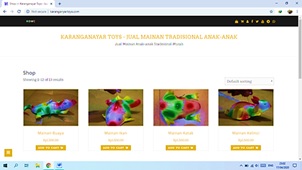Usaha Mainan Anak Tradisional Desa Karanganyar, Kabupaten Jepara Traditional Childrens Toys Business, Karanganyar Village, Jepara Regency
Main Article Content
Abstract
Karanganyar Village is a village that produces traditional children's toys with toys based on coastal environmental structures. This traditional children's toy is one of Jepara's superior products that has not been developed by the Department of Industry and Trade and MSMEs in Jepara. This results in the underdevelopment of superior local products and local cultural wisdom compared to children's toy developers in other areas such as Purwakarta and Yogyakarta. The service program is a regional superior product development program in traditional children's toy producing centers, especially at Mekar Maju MSMEs. The specific objective of this program is to assist partners in developing superior local products in Karanganyar Village in the form of traditional children's toys so that they have a variety of toys with educational value and child-friendly and helping partners develop technology-based business management patterns. The main priority in this program is solutions to problems in the production process, product design, and marketing management. The results of this service activity can help MSMEs in (1) improving the business climate, (2) increasing access to productive resources, (3) developing products and marketing for MSMEs, (4) increasing the competitiveness of HR and MSMEs
Downloads
Article Details
Authors who publish with this journal agree to the following terms:
- Any article on the copyright is retained by the author(s).
- Author grant the journal, right of first publication with the work simultaneously licensed under a Creative Commons Attribution License that allows others to share work with acknowledgment of the work authors and initial publications in this journal.
- Authors are able to enter into a separate, additional contractual arrangements for non-exclusive distribution of published articles of work (eg, post-institutional repository) or publish it in a book, with acknowledgment of its initial publication in this journal.
- Authors are permitted and encouraged to post their work online (e.g., in institutional repositories or on their websites) prior to and during the submission process, as can lead to productive exchanges, as well as earlier and greater citation of published work.
- The article and any associated published material is distributed under the Creative Commons Attribution-ShareAlike 4.0 International License
References
Darnis, F., Azdy, R.A. 2019. Pemanfaatan Media Informasi Website Promosi (e-Commerce) sebagai Upaya Peningkatan Pendapatan UMKM Desa Pedado. In SINDIMAS Seminar Nasional Hasil Inovasi Pengabdian Masyarakat. 275-278. Pontianak: STMIK Pontianak. http://dx.doi.org/10.30700/sm.v1i1.584
Hamzah, D., Nadjib, M. 2013. Pemanfaatan Internet Sebagai Media Promosi Pemasaran Produk Lokal Oleh Kalangan Usaha Di Kota Makassar. Kareba : Jurnal Ilmu Komunikasi. 2(1):30-40.
Maridi, M. 2015. Mengangkat Budaya dan Kearifan Lokal dalam Sistem Konservasi Tanah dan Air. Proceeding Biology Education. 12(1):20-39.
Puspasari, A., Mustomi, D., Anggraeni, E. 2019. Proses Pengendalian Kualitas Produk Reject dalam Kualitas Kontrol PT. Yasufuku Indonesia Bekasi. Widya Cipta : Jurnal Sekretari dan Manajemen. 3(1):71-78. https://doi.org/10.31294/widyacipta.v3i1.5088
Srihadiastuti, R., Hidayatullah, D.S. 2018. Analisis Penyebab Kegagalan Mendirikan Usaha Baru Pada Para Lulusan Program Wirausaha Baru Jawa Barat Kelas Ide Bisnis. Jurnal Ekonomi Pendidikan dan Kewirausahaan. 6(1):31-44. http://dx.doi.org/10.26740/jepk.v6n1.p31-44
Supuwiningsih, N.N., Sumadi, N.K., Muryatini, N. 2018. PKM Kelompok Penjahit Kebaya Desa Meliling Tabanan. Widyabhakti : Jurnal Ilmiah Populer. 1(1):54-60.
Triyono, J. 2020. Strategi Pengembangan Desa Wisata Tenun Ikat Troso Di Jepara, Jawa Tengah. Kepariwisataan: Jurnal Ilmiah. 14(2):84-92.
Wardani, S., Endahati, N. 2019. Pendampingan Kelompok Budidaya Mina Jaya Dusun Gupawarak Desa Sendangsari Bantul. Wikrama Parahita : Jurnal Pengabdian Masyarakat. 3(2):47-51. https://doi.org/10.30656/jpmwp.v3i2.1502
Wibowo, E.A. 2014. Pemanfaatan Teknologi E-Commerce Dalam Proses Bisnis. EQ (Equilibiria) : Jurnal Fakultas Ekonomi. 1(1):95-108.
Yap, E.Y. 2002. Enabling E-Commerce Growth Through the Social Construction of a Virtual Community’s Culture. Journal of Electronic Commerce Research. 3(4):279-294.
